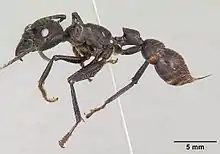Paraponera
Paraponera is a genus of ants and the only genus in the subfamily Paraponerinae.[2] The name means "near-Ponera".[3]
| Paraponera | |
|---|---|
 | |
| P. clavata, or bullet ant, the sole extant member of the subfamily | |
| Scientific classification | |
| Domain: | Eukaryota |
| Kingdom: | Animalia |
| Phylum: | Arthropoda |
| Class: | Insecta |
| Order: | Hymenoptera |
| Family: | Formicidae |
| Subfamily: | Paraponerinae Emery, 1901 |
| Tribe: | Paraponerini Emery, 1901 |
| Genus: | Paraponera F. Smith, 1858 |
| Type species | |
| Formica clavata | |
| Diversity[1] | |
| 2 species | |
It consists of two species: the extant Paraponera clavata, also known as a bullet ant, found in the Neotropics, and the very small[4] fossil species Paraponera dieteri known from Dominican amber (Early Miocene; 16-19 million years ago).[5] Bullet ants are so named for the pain caused by their venomous stings. The intensely painful sting is toxic to invertebrates as well as vertebrates and a major component is the neurotoxic peptide poneratoxin.[6]
Species
- Paraponera clavata (Fabricius, 1775)
- †Paraponera dieteri Baroni Urbani, 1994
References
- Bolton, B. (2014). "Paraponera". AntCat. Retrieved 5 July 2014.
- "Genus: Paraponera". antweb.org. AntWeb. Retrieved 13 October 2013.
- Wheeler, George C. (1956). Myrmecological Orthoepy and Onomatology (PDF). University of North Dakota Press. pp. 4, 17.
- Baroni Urbani, C. (1994). "The identity of the Dominican Paraponera (Amber Collection Stuttgart: Hymenoptera, Formicidae. V: Ponerinae, partim)". Stuttgarter Beiträge zur Naturkunde. Serie B (Geologie und Paläontologie): 1–9.
- "Species: †Paraponera dieteri". antweb.org. AntWeb. Retrieved 13 October 2013.
- Aili, Samira R.; Touchard, Axel; Petitclerc, Frédéric; Dejean, Alain; Orivel, Jérôme; Padula, Matthew P.; Escoubas, Pierre; Nicholson, Graham M. (2017). "Combined Peptidomic and Proteomic Analysis of Electrically Stimulated and Manually Dissected Venom from the South American Bullet Ant Paraponera clavata". Journal of Proteome Research. 16 (3): 1339–1351. doi:10.1021/acs.jproteome.6b00948. hdl:10453/123916. PMID 28118015.
This article is issued from Wikipedia. The text is licensed under Creative Commons - Attribution - Sharealike. Additional terms may apply for the media files.